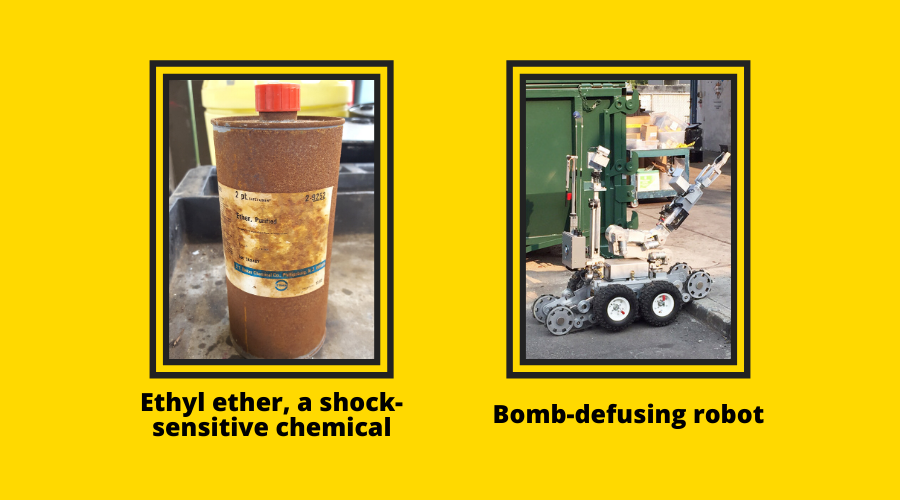
“It’s lit” is something you want to hear at a party but not when a customer brings in explosive materials to a hazardous waste collection site.
The Hazardous Waste Management Program (Haz Waste Program) operates four fixed locations where residents can bring household hazardous wastes for safe disposal. On a typical day, customers bring products like oil-based paint, pesticides, and fluorescent light bulbs. Customers also drop off products that are higher on the hazardous scale, like propane tanks and fuel, which need to be properly handled to keep people safe.
Sometimes, customers will bring in plainly dangerous wastes like lab-grade chemicals. What’s the big deal? Lab chemicals can cause explosions. We won’t get into the science, but in short: expired or improperly stored chemicals can become unstable, forming crystals that become shock sensitive. Some of these crystals can be so sensitive that even bumping or jostling a container can cause a booming reaction.
We spoke with Nick Saelee, Environmental Field Supervisor at the North Seattle Haz Waste Facility, about what happens when explosive lab-grade chemicals are brought to a collection site. “We work with local fire, police, and sheriff departments and bomb unit technicians to neutralize the chemical. After that, the product is sent for proper disposal,” Nick said.
How do lab chemicals wind up at our haz waste sites? They can come from businesses in the chemical or pharmaceutical industries. Though rarer, residents can bring in lab chemicals too. “People cleaning out the homes or garages of their elders can come across these items and bring them in for disposal with the other, more common, haz waste they find like oil-based paint and automotive products,” Nick shared.
It goes without saying, but we’re going to say it anyway – explosives are extremely dangerous. Under no circumstances should you attempt to open, handle, or transport them. Nick urges customers to stay safe by calling the Haz Waste Program first before taking any action, “The best thing to do is to call the Haz Waste Help Line for specific disposal advice. Calling ahead is required for business customers so that we can confirm the proper authorization and paperwork needed to dispose of lab chemicals.”
Here’s the simple takeaway: If you have unknown or dangerous waste, including lab-grade chemicals, call 206-296-4692 before you visit a King County haz waste disposal site.
Follow these additional safety tips before your visit to keep yourself, other customers, and our staff safe:
- Do not mix or combine products
- Keep products in their original containers whenever possible
- Label products that are not marked
- Secure products so they won’t tip or leak
- Cover and tie down your load
- Stay in your vehicle when unloading at the Auburn Wastemobile or traveling Wastemobile
- Do not transport products in the passenger component of your vehicle
Do you want to learn more about haz waste collection services in King County?
- Learn more about safe haz waste disposal for households
- Learn more about safe haz waste disposal for businesses
Questions? Call the Haz Waste Help Line at 206-296-4692 or email haz.waste@kingcounty.gov Monday-Friday, 9 a.m. to 4:30 p.m.
Photos courtesy of Nick Saelee